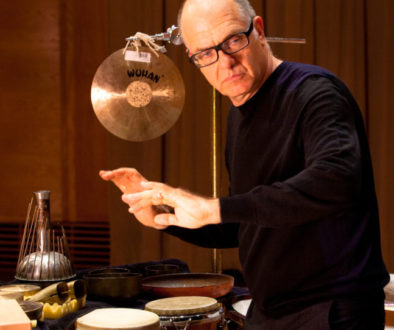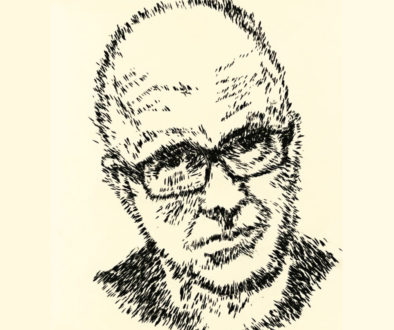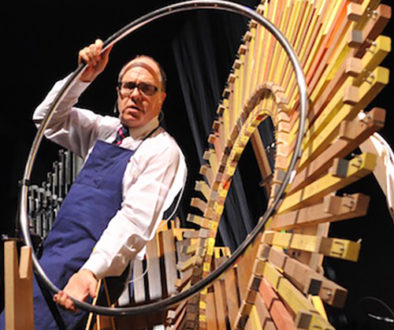Steven Schick dazzles in Boulez’s ‘Répons’
By Christian Hertzog, The San Diego Union-Tribune
Originally published February 2, 2017; full text and original article visible here.
“‘Schick Happens.’
It’s a slogan known well in contemporary music circles. Wednesday evening at UC San Diego’s Mandeville Auditorium, Steven Schick presided over an unusual American performance of Pierre Boulez’s “Répons,” demonstrating how he earned that accolade.
“Répons” (“Response”) is a musical triumph but a financial challenge. Requiring a chamber orchestra of 24 musicians, six soloists (including that rarity, a cimbalom virtuoso), and a team of sound technicians and computer processors, it also needs a venue where the orchestra can be encircled by the audience, who in turn are surrounded by soloists and loudspeakers.
The logistics of funding and mounting a performance of “Répons” are so overwhelming that any opportunity to see it live without buying a plane ticket to Europe should be seized.
Enter the UCSD Department of Music and conductor Schick. His professorship there is endowed by the Reed Family, and for the second consecutive year, he has used his endowment funds to present an impractical composition which otherwise would not be heard locally.
“Répons” is an extravagant 20th-century computerized concerto grosso, 45 minutes of arpeggios, trills and machine-like pulses, surprisingly revealed, explored and held together by Boulez’s compositional mastery. The six confident soloists were Aleck Karis on piano and organ, Kyle Adam Blair on piano, Fiona Digney and James Beauton on mallet percussion, Julie Smith Phillips on harp, and Nicholas Tolle on cimbalom (a Hungarian dulcimer), all of them brilliantly sparkling on their exuberant flourishes and cadenzas.
The soloists were not only heard acoustically and distributed around the hall via loudspeakers, but also processed by a complicated program running on one petite laptop, a startling improvement over Boulez’s original team of technicians fussing over huge racks of proprietary computer gear like scientists in a 1930s science fiction film.
The orchestra consisted of UCSD faculty, students, and some of our finest local musicians, many from the San Diego Symphony. In “Répons”, the conductor exerts enormous influence over the music, choosing entrances and lengths of held notes. Schick was ideally sympathetic to Boulez’s fluid sense of time and the large-scale drama of the work. He cued musicians in front, to the sides, and behind him, overseeing precise musicianship, injecting excitement and mystery into the score. It was a stunning performance that should be fondly remembered by all present.
Unlike “Répons,” Varèse’s “Octandre” is frequently programmed. I’ve seldom heard, though, so incisive, biting and bold a performance as the eight musicians and Schick gave. Oboist Sarah Skuster gave the disjunct opening solo a haunting lyricism, and trombonist Eric Starr tightly barked out his forceful lines.
Schick commissioned Anahita Abbasi for a work to act as commentary on “Octandre” using the same instruments. The result, “Cordatum,” was a quiet meditation, punctuated by silence, on melodic figures from “Octandre.” Schick programmed it between two performances of “Octandre” with no break between, a lovely leaf of heirloom lettuce sandwiched between two dense hunks of Varése bread.
If “Octandre” is a loudly pontificating New Yorker manspreading on the subway, Abbasi’s “Cordatum” is a demure passenger scooched next to him, softly but firmly making points about similar issues. It was a programing risk that didn’t quite pay off; “Cordatum” might function better as a distant memory of “Octandre” separated by an intermission, or perhaps an entire concert.”


